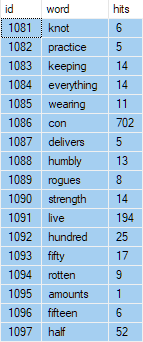The best way I have found to speed up leading wildcard LIKE searches is to use n-grams. I describe the technique and provide a sample implementation in Trigram Wildcard String Search in SQL Server.
The basic idea of a trigram search is quite simple:
- Persist three-character substrings (trigrams) of the target data.
- Split the search term(s) into trigrams.
- Match search trigrams against the stored trigrams (equality search).
- Intersect the qualified rows to find strings that match all trigrams.
- Apply the original search filter to the much-reduced intersection.
It may be suitable for your needs, but be aware:
Trigram search is no panacea. The extra storage requirements, implementation complexity, and impact on update performance all weigh heavily against it.
Test
I ran a quick test using the Complete Works of Shakespeare to populate the body column of the items table with 15,838 rows. I loaded the words table with 7,669 unique words from the same text.
The trigram structures built in around 2 seconds and the following update statement completed in 5 seconds on my mid-range laptop:
UPDATE dbo.words WITH (TABLOCK)
SET hits =
(
SELECT COUNT_BIG(*)
FROM dbo.Items_TrigramSearch
('%' + word +'%') AS ITS
);
A selection of the updated words table:

The modified trigram scripts from my article are below:
CREATE FUNCTION dbo.GenerateTrigrams (@string varchar(255))
RETURNS table
WITH SCHEMABINDING
AS RETURN
WITH
N16 AS
(
SELECT V.v
FROM
(
VALUES
(0),(0),(0),(0),(0),(0),(0),(0),
(0),(0),(0),(0),(0),(0),(0),(0)
) AS V (v)),
-- Numbers table (256)
Nums AS
(
SELECT n = ROW_NUMBER() OVER (ORDER BY A.v)
FROM N16 AS A
CROSS JOIN N16 AS B
),
Trigrams AS
(
-- Every 3-character substring
SELECT TOP (CASE WHEN LEN(@string) > 2 THEN LEN(@string) - 2 ELSE 0 END)
trigram = SUBSTRING(@string, N.n, 3)
FROM Nums AS N
ORDER BY N.n
)
-- Remove duplicates and ensure all three characters are alphanumeric
SELECT DISTINCT
T.trigram
FROM Trigrams AS T
WHERE
-- Binary collation comparison so ranges work as expected
T.trigram COLLATE Latin1_General_BIN2 NOT LIKE '%[^A-Z0-9a-z]%';
GO
-- Trigrams for items table
CREATE TABLE dbo.ItemsTrigrams
(
id integer NOT NULL,
trigram char(3) NOT NULL
);
GO
-- Generate trigrams
INSERT dbo.ItemsTrigrams WITH (TABLOCKX)
(id, trigram)
SELECT
E.id,
GT.trigram
FROM dbo.items AS E
CROSS APPLY dbo.GenerateTrigrams(E.body) AS GT;
GO
-- Trigram search index
CREATE UNIQUE CLUSTERED INDEX
[CUQ dbo.ItemsTrigrams (trigram, id)]
ON dbo.ItemsTrigrams (trigram, id)
WITH (DATA_COMPRESSION = ROW);
GO
-- Selectivity of each trigram (performance optimization)
CREATE OR ALTER VIEW dbo.ItemsTrigramCounts
WITH SCHEMABINDING
AS
SELECT ET.trigram, cnt = COUNT_BIG(*)
FROM dbo.ItemsTrigrams AS ET
GROUP BY ET.trigram;
GO
-- Materialize the view
CREATE UNIQUE CLUSTERED INDEX
[CUQ dbo.ItemsTrigramCounts (trigram)]
ON dbo.ItemsTrigramCounts (trigram);
GO
-- Most selective trigrams for a search string
-- Always returns a row (NULLs if no trigrams found)
CREATE FUNCTION dbo.Items_GetBestTrigrams (@string varchar(255))
RETURNS table
WITH SCHEMABINDING AS
RETURN
SELECT
-- Pivot
trigram1 = MAX(CASE WHEN BT.rn = 1 THEN BT.trigram END),
trigram2 = MAX(CASE WHEN BT.rn = 2 THEN BT.trigram END),
trigram3 = MAX(CASE WHEN BT.rn = 3 THEN BT.trigram END)
FROM
(
-- Generate trigrams for the search string
-- and choose the most selective three
SELECT TOP (3)
rn = ROW_NUMBER() OVER (
ORDER BY ETC.cnt ASC),
GT.trigram
FROM dbo.GenerateTrigrams(@string) AS GT
JOIN dbo.ItemsTrigramCounts AS ETC
WITH (NOEXPAND)
ON ETC.trigram = GT.trigram
ORDER BY
ETC.cnt ASC
) AS BT;
GO
-- Returns Example ids matching all provided (non-null) trigrams
CREATE FUNCTION dbo.Items_GetTrigramMatchIDs
(
@Trigram1 char(3),
@Trigram2 char(3),
@Trigram3 char(3)
)
RETURNS @IDs table (id integer PRIMARY KEY)
WITH SCHEMABINDING AS
BEGIN
IF @Trigram1 IS NOT NULL
BEGIN
IF @Trigram2 IS NOT NULL
BEGIN
IF @Trigram3 IS NOT NULL
BEGIN
-- 3 trigrams available
INSERT @IDs (id)
SELECT ET1.id
FROM dbo.ItemsTrigrams AS ET1
WHERE ET1.trigram = @Trigram1
INTERSECT
SELECT ET2.id
FROM dbo.ItemsTrigrams AS ET2
WHERE ET2.trigram = @Trigram2
INTERSECT
SELECT ET3.id
FROM dbo.ItemsTrigrams AS ET3
WHERE ET3.trigram = @Trigram3
OPTION (MERGE JOIN);
END;
ELSE
BEGIN
-- 2 trigrams available
INSERT @IDs (id)
SELECT ET1.id
FROM dbo.ItemsTrigrams AS ET1
WHERE ET1.trigram = @Trigram1
INTERSECT
SELECT ET2.id
FROM dbo.ItemsTrigrams AS ET2
WHERE ET2.trigram = @Trigram2
OPTION (MERGE JOIN);
END;
END;
ELSE
BEGIN
-- 1 trigram available
INSERT @IDs (id)
SELECT ET1.id
FROM dbo.ItemsTrigrams AS ET1
WHERE ET1.trigram = @Trigram1;
END;
END;
RETURN;
END;
GO
-- Search implementation
CREATE FUNCTION dbo.Items_TrigramSearch
(
@Search varchar(255)
)
RETURNS table
WITH SCHEMABINDING
AS
RETURN
SELECT
Result.body
FROM dbo.Items_GetBestTrigrams(@Search) AS GBT
CROSS APPLY
(
-- Trigram search
SELECT
E.id,
E.body
FROM dbo.Items_GetTrigramMatchIDs
(GBT.trigram1, GBT.trigram2, GBT.trigram3) AS MID
JOIN dbo.Items AS E
ON E.id = MID.id
WHERE
-- At least one trigram found
GBT.trigram1 IS NOT NULL
AND E.body LIKE @Search
UNION ALL
-- Non-trigram search
SELECT
E.id,
E.body
FROM dbo.Items AS E
WHERE
-- No trigram found
GBT.trigram1 IS NULL
AND E.body LIKE @Search
) AS Result;
The only other change was to add a clustered index to the items table:
CREATE UNIQUE CLUSTERED INDEX cuq ON dbo.items (id);

